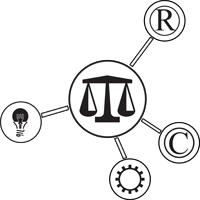In many instances, a simple “cease and desist” letter informing an infringer of another’s intellectual property rights is sufficient to resolve the matter.
However, in some situations, a lawsuit may be the only recourse to stop one company from infringing another’s patent, trademark or copyright, or misappropriating its intellectual property rights. The stakes are often high in intellectual property litigation and a company’s very viability and reputation can be at risk.
Kelly & Kelley, LLP has substantial litigation experience, both enforcing its clients’ intellectual property rights and in defending them against charges of infringement. The firm limits its practice to intellectual property law, and thus all of its litigation involves disputes concerning patents, trademarks, copyrights, trade secrets, acts of unfair competition and false advertising, rights of publicity and related licensing and anti-trust issues. K&K has handled cases from clients in a broad range of industries, and sought resolution of disputes involving all types of intellectual property. Representing both plaintiffs and defendants, K&K has tried cases in front of juries and judges, in federal and state courts, and before administrative bodies such as the U.S. Patent and Trademark Office.
Litigation Process
Typically, a Complaint is filed to initiate a lawsuit in federal or state court. An Answer to the Complaint must be filed soon thereafter (20 days). In some instances, where more immediate relief is sought, an application for a Temporary Restraining Order or Preliminary Injunction is filed to immediately prevent further infringing acts.
After the initial filing of the lawsuit, the parties typically exchange Discovery Requests seeking documents and answers to specific questions. Discovery also typically involves the deposition of potential witnesses and individuals having relevant knowledge of the issues in the case.
With the information obtained during Discovery, motions are considered for deciding the case before trial or paring down the issues to be tried. The time period between initiating the lawsuit and the actual trial can be several months to a year or more. In matters before the USPTO, there is no “trial”, although a similar series of Discovery Requests, depositions and filing of motions takes place.
To hold down legal costs, K&K considers efficiencies during the litigation process such as preparing opinions about infringement, examining the merits of a case, and assessing the likelihood of success.
Intellectual property is the life-blood of many companies. K&K views intellectual property as a strategic business tool, and works closely with its clients to develop and implement a litigation strategy that complements their overall business objectives.
